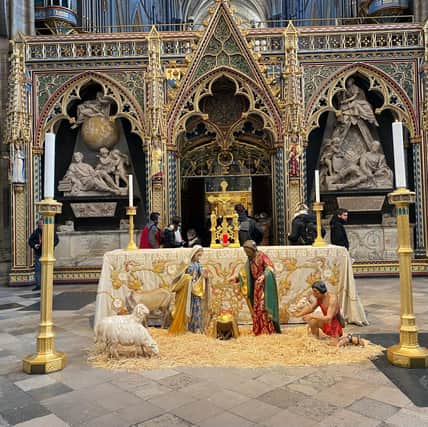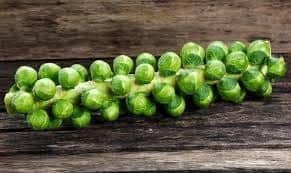Agriculture remains at the very heart of the Christmas narrative


Throw in the oxen, sheep and shepherds – watching their flocks by night – and it’s hard not to develop a warm feelings for farmers and the animals in their care.
But Christmas is a one-off. Somewhere along the way, the farming industry has lost that day-to-day contact with the consumers they serve and provide for.
And we need to get that back.


Advertisement
Advertisement
The reality, of course, is that farmers across Northern Ireland continue to play a crucially important a role within rural communities today, as was the case generations ago.
And the same amount of hard work is required to keep the food coming and the animals looked after as would have always been the case.
In fact, many farmers would argue that the pressures on them today are greater than has been the case heretofore.
The truth is that the growing rural:urban divide has brought about a scenario within which the vast majority of people living in our towns and cities have no concept of the work, toil and effort put in on farms throughout the country.
Advertisement
Advertisement
So maybe it’s time for a ‘down on the farm’ Christmas story: the 2022 version.
It’s 04.30am on Christmas morning. The alarm has just gone off and a guy, let’s say, in his mid-30s leaves the comfort of a very warm bed.
Five minutes later, he is quietly opening the back door of the farm house and heading out into the darkness. It’s cold, wet and Christmas cheer is pretty thin on the ground. His first point of destination is the milking parlour. He has left behind his wife and two young children, no doubt dreaming about the presents Santa Claus will bring them.
The lights are switched on, the parlour is set up and the two, all-important, generator buttons kick-in.
Advertisement
Advertisement
A prayer of thanks is muttered and then it’s off to a cubicle shed to gather up 100 cows for milking. One cow, though, is very slow to get up: note taken!
Slowly but surely the cows are milked. Each one stripped before the clusters are put on: thankfully no cases of felon this morning. But the cow that was slow to get up has a very sore foot. Again note taken!
All of this takes 90 minutes – which stretches out to two hours with the washing down of the parlour and the rinsing out of the milking plant
Given that it’s Christmas morning, the man who usually helps out is on holiday. So the cows are kept in a collecting yard while the farm owner scrapes out their shed and puts fresh bedding down on the cubicle mattresses.
Advertisement
Advertisement
After that, it’s feeding time. That could be another hour’s job. Meanwhile, the cow with the sore foot needs attention.
By now it’s full light and it’s a case of getting back to the farm house for breakfast and the opening of the presents with the children.
But switching off for the rest of the day is not an option. The calves and the rest of the young stock need fed and attended to.
Each calf is individually checked for any sign of dullness or scour. It’s all time consuming work. And the same principle holds, where the weanlings are concerned.
Advertisement
Advertisement
The farmer will probably get back to the comfort and warmth of the house by noon. It’s then a judgement call as to whether Christmas lunch is taken then or should the afternoon milking be brought forward with lunch to follow thereafter?
Either way, the dairy farmers and his family members have no option but to put their working clothes back on and commit to another spell in the milking parlour.
There is a fundamental principle must always be adhered to. And it’s this: the needs of the animals always come first.
With this in mind, the aforementioned cow with the sore foot is looked at again. The decision is taken to put her in a straw bedded pen for the night with the option of getting the vet the next day a distinct possibility.
Advertisement
Advertisement
All of this is taking place while the vast of the public spend Christmas morning in their dressing gowns, drinking tea and coffee in their warm and comfortable homes.
I picked a ‘hypothetical’ dairy farm for the purposes of this piece. But the same ‘commitment related’ challenges confront all local livestock farmers on Christmas Day – and every other day of the year for that matter.
Thousands of lambs will be born on our farms in the run-up to Christmas. Each ewe and newborn lamb will need all the care and attention that farmers can give them.
And the same principle holds when it comes to calving suckler cows. It’s all about that all-embracing commitment on the part of the farmer to try and make things right.
Advertisement
Advertisement
I sense the general public have lost touch with this reality. And shame on our farming industry for allowing this to happen.
In my opinion, farmers are the most undervalued members of our society.
If dairy farmers were getting £1/L for their milk, it still wouldn’t be enough to compensate them for the time, investment and hard work required to produce the food in the first place.
Farmgate prices, across the board, have not kept up with inflation for decades. Meanwhile, the amount of support available to agriculture continues to decline in real terms.
Advertisement
Advertisement
However, this has not stopped our farmers from producing more food than ever before.
This is an amazing success story, one that fails to get its fair share of publicity.
Farming is a 24:7, 365-day commitment on the part of those involved.
And, particularly at Christmas time, I think it would be more than appropriate for the rest of society to raise a glass in the direction of their ‘farming colleagues’ for a job well done!
Hail the humble sprout
Advertisement
Advertisement
The humble Brussels sprout is a take-it or leave-it Christmas vegetable for many people.
Personally, I love them. They have a unique taste, which complements all types of meat.
As far as I am concerned the sprout is the vegetable that just keeps on giving.
My father was an avid supporter of this unique brassica, particularly as a regular feature within the kitchen garden.
Advertisement
Advertisement
And why was this? Obviously, the buttons are always worth a nibble. But when they are gone, what’s left includes the crown of the plant - the sweetest bit of cabbage that one could ever eat.
It’s always best to leave sprouts on the plant until Jack Frost has had his way. Come the cold: comes the sweetness. And, of course, the same principle holds where turnips are concerned.
The other amazing feature of a mature spout plant is the arrangement of the buttons along the stem. To me, they resemble a Mother-of-Pearl configuration. Each one is a work of art in its own right.
And, just like honeycomb, every arrangement is different.
Recent years have seen many fruit and veg shops selling sprouts that are still attached to the stem, making for very attractive window decorations.
Advertisement
Advertisement
The one downside to spouts is the fact that they are not the easiest of vegetables to grow. They need plenty of space and demand a soil with quite a high pH value.
But the biggest challenge is that of keeping the roots stable, particularly during the autumn period. If the plants get too big a shaking, then the buttons will fail to close over.
Brussels sprouts are an excellent source of protein, minerals and vitamins. They are a staple contributor to festive menus across Europe and North America. And long may this continue to be the case.
But sprouts just aren’t to everyone’s taste.
For the record, I have a bit of history in liking foods that may not go down well with others.
Advertisement
Advertisement
Back in the day, I was a big fan of tapioca (frog spawn) and the custard that came in a metal jug from the school kitchen. The thin layer of solid custard at the top of the ‘pitcher’ was to die for.
So, while everyone else was outside kicking a football around, myself and best friend John Nolan remained at the dinner table – gorging ourselves with top end desserts.... I so loved school.
So, what is your favourite Christmas poem?
Everyone has a favourite Christmas song – or in my case a Christmas poem.
I was never a great fan of English – as a subject - at school. But that all changed when I was made aware of a poem, penned by the American poet Robert Frost: ‘Stopping by Woods on a Snowy Evening.
Advertisement
Advertisement
It was written in 1922 and, from the instant of my reading it at the age of 15, the poem brought home an imagery and messaging around Christmas that will resonate inside of me for always.
There are many interpretations of the themes within the poem. Some say that it relates to a farmer returning home from market on the shortest day of the year; not having been able to secure the money needed to buy Christmas presents for has children.
Others believe it to be a version of the original Christmas story, centred on St Nicholas as the narrator (the original Santa Claus). To be honest, that was the version of events that always struck home with me
But I am not an academic. All I really know is that the wording of the poem chimes perfectly with the way that my brain works.
Advertisement
Advertisement
Mind you, I have walked through woods as the show was falling and the eerie silence that accompanies the landing of the flakes is pretty amazing.
Maybe this is something to do with my liking for the poem.
And let’s not kid ourselves: it also got me through the odd examination as well – back in the day.
The poem follows in full:
Stopping by Woods on a Snowy Evening
Whose woods these are I think I know.His house is in the village though;He will not see me stopping hereTo watch his woods fill up with snow.My little horse must think it queerTo stop without a farmhouse nearBetween the woods and frozen lakeThe darkest evening of the year.He gives his harness bells a shakeTo ask if there is some mistake.The only other sound's the sweepOf easy wind and downy flake.The woods are lovely, dark and deep,But I have promises to keep,And miles to go before I sleep,And miles to go before I sleep.